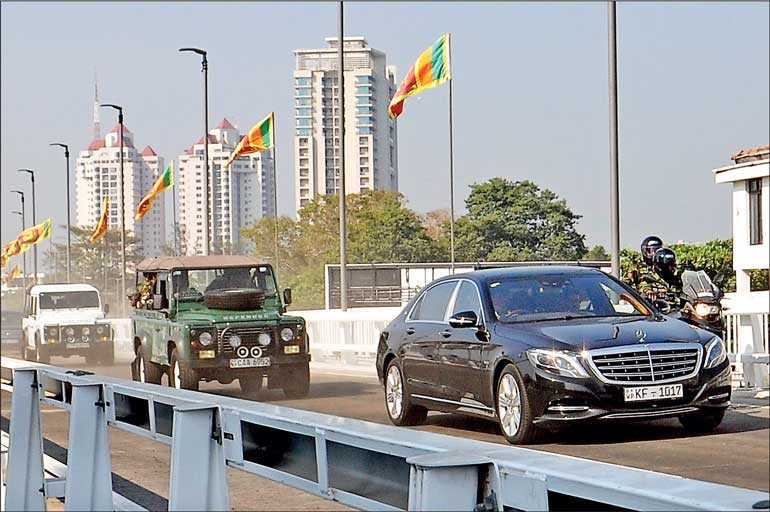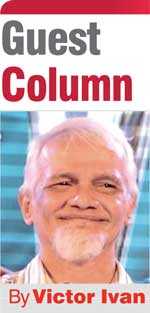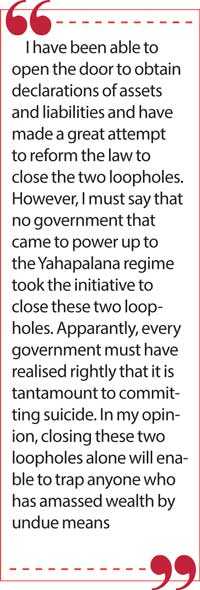Friday Feb 20, 2026
Friday Feb 20, 2026
Friday, 28 February 2020 00:00 - - {{hitsCtrl.values.hits}}

The whole system of the country which has been crumbling is now on the verge of near collapse. The political regime, bureaucracy, intellectuals and the society in general did not have a sufficiently  developed political imagination to understand the need to rectify the mistakes and errors that occurred from time to time, due to various reasons. The outcome of this situation was that they had become compounded and solidified, turning the whole system into a rotten and stinking mess.
developed political imagination to understand the need to rectify the mistakes and errors that occurred from time to time, due to various reasons. The outcome of this situation was that they had become compounded and solidified, turning the whole system into a rotten and stinking mess.
Now the whole system of Sri Lanka is in a state of complete deterioration, and even then, it is strange that no one has been able to realise the need for correcting it through structural reforms. The only thing that can happen in a situation like this is the collapse of the entire system, before our very eyes.
The political system can be compared to a complex machine. Even a normal machine needs to be serviced on a regular basis and repaired when defects occur. Similarly, the political system also requires servicing and repairing. If these two basic requirements are not met adequately, it is likely that the machine may fall into disrepair before its time so that it can no longer be used.
The political system
Generally, in modern times, the lifespan of a political system is counted not by decades but by centuries. Britain has the oldest political system in the world. It is 1,427 years old. Switzerland has the next oldest political system; it is about 727 years old. It is not a representative democratic system that we find in the UK or the United States. It is a mixture of both representative democracy and direct democracy. The US Constitution is 233 years old.
Sri Lanka has adopted three constitutions during the past 72 years since Independence. The second Republican Constitution, which is 42 years old now, can be said to have become an utter mess that can no longer be used for successful State administration.
Generally, as indicated above, the lifespan of a constitutional system is counted by centuries. But, a constitution which has been adopted improperly and not maintained well with necessary services and repairs being effected when the need arises can collapse in a few decades instead of lasting for centuries.
Now, Sri Lanka is faced with a similar confusion. When a machine is completely dilapidated and collapsed, a similar machine or even a better one can be purchased from the market. But it is impossible to purchase a readymade system from the market when the political system of the country is collapsed. It should necessarily be built by the people of that country. It is not simple or easy, but a difficult and complicated task.
The stray journey
Lack of advanced thinking has had an adverse impact on the socio-political situation and the economy of Sri Lanka. There was no abolition of feudalism and the land tenure and the feudal service system associated with it even after gaining independence. There was no abolition of the caste system either. Also, there was no attempt to build the modern nation to ensure co-existence between different ethnic groups and religions. In this background, the political system can be said to have evolved without having a solid foundation.
Even though Sri Lanka gained independence without shedding a single drop of blood, 10 years after independence the country was plunged into ethnic conflict; 20 years later, it turned into a violent struggle that persisted for 30 long years making the country a land of incessant bloodshed on large scale. The divisive factors of race, caste and religion, in one way or another caused the violent youth uprisings in the Tamil north and the Sinhalese south.
The prolonged uncivilised environment prevailed in the country had a devastating impact on socio-political and economic system. It caused the whole system to be crippled, weakened and corrupt. In this process, both parties, the rebels and the security forces unleashed maximum cruelty on the society. A large number of people were killed, and all those who were able to survive physically, were killed spiritually to a greater of lesser degree.
In that horrific social environment, State rule had become a way of plundering public wealth. Eventually, this situation resulted in rendering the entire State and its institutional system ineffective and corrupt. Notwithstanding the Government being able to defeat, though belatedly, the two uprisings of the Sinhala youth in the south and Tamil youths in the north, both uprisings had however caused serious damage to the State, making it weak and degenerated.
After ending the internal civil war, it had become an essential condition to introduce structural changes and recreate the entire system which had become distorted and degenerated, in order to ensure the survival of the entire system. But neither the Rajapaksa Government, which won the internal war, nor the Yahapalana regime, which came to power later, was able to realise this need.
It can be said that the entire system had reached a level of collapse in the face of usual predatory policy followed by both regimes ignoring the essential reforms. The country is now on the brink of a catastrophic destruction.
Vehicle mania
Most of my time has been spent exploring and writing about the degeneration of the entire system, including the State of Sri Lanka. I believe that some of my experiences in this respect may be useful to understand this issue better.
The system of offering super grade motor vehicles for MPs, which they can use to earn a substantial income, at the cost of public funds can be considered a significant factor having symbolic importance, among many other factors, that has led to bankrupting the country. It was late President J.R. Jayewardene who initiated this shady system. It can be considered a corrupt and ugly system not operative in any other country where a democratic system of governance is being practiced.
The hidden purpose of offering a supra grade motor vehicle to MPs once every five years was to keep them happy by providing them with an opportunity to generate a large income by selling it at the end of five years. Later, this corrupt system was extended to senior Government officials as well. In addition to offering duty-free vehicle licenses once in five years, they were allowed to take home a vehicle worth Rs. 30 to 40 million for a comparatively negligible price of about Rs. 1 million when they retire from the public service.
Gradually, the type of vehicles and the number of vehicles used by high-ranking politicians increased dramatically. The price of a vehicle used by Presidents, Prime Ministers and Ministers increased to over and above Rs. 100 million and the number of vehicles in their reserve of vehicles also went up.
A system that allowed Ministers to maintain a private staff consisting of six officers and 28 employees in addition to their official staff was set up. This can be considered one of the most expensive and corrupt systems not to be found in any other democratic country in the world. The six staff members of the Minister’s personal staff were also offered duty free vehicle licences once every five years in addition to their official vehicles. Often, the six officers of the minister’s personal staff consisted of his family members or close relatives. Thus, the number of duty-free vehicle permits issued to a family of a minister increased to seven.
The cost incurred by the Government of Sri Lanka to maintain this corrupt system is huge. It is worth comparing the meagre sum of Rs. 20 that the Government spends per day on a destitute child in an orphanage with the money spent on motor vehicles for ministers and MPs which is over Rs. 50 million.
Sirimavo Bandaranaike
No one elected to the Parliament, whether educated or not, good or bad, has objected to this corrupt system of giving MPs duty free vehicles, a system not to be found in any other democratic country in the world. Generally, what happened is the adaptation of MPs to this corrupt and ugly system when they get elected to Parliament.
Once I inquired about this at a discussion held on several issues including the issue of vehicles when Sirimavo Bandaranaike was the Leader of the Opposition (in 1991). Bandaranaike, J.R.P. Suriyapperuma, Party Secretary, Mahinda Rajapaksa, Anuruddha Ratwatte and Dr. Neville Fernando were also present at this discussion.
“If you allege that President Jayewardene is pursuing a policy of bribing parliamentarians to win their support, why didn’t the SLFP oppose the corrupt system of granting duty-free permits to MPs, a system not in operation in any other democratic country in the world?” I asked Bandaranaike. She didn’t have a clear answer to that. 
Dr. Neville Fernando had ordered biryani for lunch for the participants followed by the discussion held at Rosemead home of Bandaranaike. Normally, the quantity of food that I eat at lunch is little. Having finished eating before the others, I went to the pantry to wash my fingers. Dr. Neville Fernando also came there. He smiled and remarked that “it was only today I realised that Victor Ivan will get killed not by an UNPer but by a SLFPer”. He also stated that “the SLFP leaders who had been out of office for 16 years are greedier than the UNP leaders”.
Wijamu Lokubandara
During a discussion I had with Wijamu Lokubandara, the Minister of Cultural Affairs at the time, he taught me a wonderful lesson on how they run the system.
“As members of the Government, we eat well. We get enough to eat like gluttons. We let the Opposition also eat well, though not to the extent that we do. Apart from that, a selected clique of Opposition is allowed to eat more than the others in the Opposition.” Then he concluded his remarks, saying, “Therefore, my dear friend, it will not be easy to change this Government.”
All the other governments that came to power after that implemented a similar policy as explained by Wijamu Lokubandara with certain changes.
There was a big monied man visible or invisible behind every political leader who had the potential to become the head of State. It is this rich person who used to defray all expenses incurred when the leader travels both locally and overseas. The leader had a strong connection with the rich person who backs him. It is possible to say that the rich man could make a decisive influence on all important decisions made by the leader. Similarly there are rich men behind those who have the potential to become cabinet ministers.
Black money
Black money plays an important role not only in maintaining political parties but also in running election campaigns. I heard about a strange incident that had taken place when President Jayewardene decided not to contest for a third term due to strong objections that came from Prime Minister Premadasa, and giving the opportunity to the latter to contest the election.
President Jayewardene had summoned Ranjan Wijeratne to his residence and instructed him to hand over all the money kept under lock and key in a huge closet to presidential candidate Premadasa. Later, following the assassination of President Premadasa, it was revealed that there was a huge sum of money amounting to millions of rupees at Sucharitha, the home of President Premadasa. The money kept in a huge closet of President Jayewardene and the money stored at Sucharitha can be treated as black money and not as money earned legally.
I had the rare opportunity of witnessing how Chandrika Kumaratunga received financial aid at the 1994 Parliamentary Election. One day, summoned by Chandrika Kumaratunga, I went to the official residence of the Leader of the Opposition. That was a day reserved for the receipt of financial support in excess of Rs. 1 million from donors. I was asked to stay in a room until the financial aid program was over. It gave me an opportunity to get a glimpse of that carnival like incident in which the donors handed over the parcels of money to Chandrika Kumaratunga.
Anuruddha Ratwatte was the one who handled the money queue on the ground floor. Chandrika was upstairs. The time allotted to each donor did not exceed more than two to three minutes. The donors approached Chandrika on a queue, carrying parcels of money, one after the other. Apparently the donors could not see me, but I could see them from where I was seated in the room.
After the donor queue was over, Anuruddha came upstairs and I too came out of the room. There were over 40 parcels of money, each containing Rs. 1 million or more stacked on chairs. There was no documentation or issuance of receipts when donations were received. I simply asked Chandrika what she would give back to the donors who had given her the money. My questioning angered her. “How can we do the election without money?” She retorted in a tone that showed her anger. But soon she was back to normal.
This can be considered only the collection in one single day allocated for receipt of financial support. It is one way of raising funds for elections by political parties. There are other methods as well. But there is no room here for me to go into details. Suffice it to to say that this system is corrupt and contrary to the law.
Assets and Liabilities Law
In my opinion, the Assets and Liabilities Law is the most powerful tool available in Sri Lanka to combat corruption. It is more powerful than the Bribery and Corruption Commission. It can be considered a law which has a most progressive and practical vision capable of trapping those who have acquired assets by undue means; but the Sri Lankan version of this law is designed with two glaring loopholes that enable the wrongdoers to circumvent the law.
Initially, the access to the declarations of assets and liabilities remained closed to the public. I may be the first person to have gained access to them. The Secretary of Parliament asked me to bring a Court order when I contacted him over the phone in 1991 and asked for the copies of the declaration of assets and liabilities by the MPs. This was the situation prevailing everywhere at that time.The 1994 election manifesto of the Podu Peramuna (United Front) included the policy it intended to implement in relation to the Assets and Liabilities Law. I was instrumental in having it inserted in the election manifesto. But Chandrika’s Government did not keep that promise.
Following K. B. Ratnayake being appointed the Speaker of the Parliament, in a letter detailing the Assets and Liabilities Law, I requested him to provide me with certified copies of the declaration of assets and liabilities of the MPs. The Speaker, thanking me for pointing out the law, advised me to obtain the certified copies of the declarations of assets and liabilities after paying the copying charge; he had further stated that he had informed the Secretary of Parliament in this respect. Accordingly, I got the copies I needed. It was the first time the gates of Parliament were opened on this subject.
Thereafter, during the 1999 Presidential Election, I wrote a similar letter to Dayananda Dissanayake, the Commissioner of Elections, explaining the law pertains to the declaration of Assets and Liabilities, with a cheque for Rs. 5,000, requesting certified copies of the declaration of assets and liabilities submitted by Chandrika and Ranil with their nominations.
The Commissioner of Elections sent me the certified copies of the two declarations along with the balance money. It was because of a feud created by me that a tradition of obtaining assets and liabilities from presidential candidates when handing over nomination was established.
According to the Assets and Liabilities Law, when a request is made for a copy of a declaration of any person, the authority concerned should provide it without raising any question. In this backdrop, I was shocked when I heard that Transparency International had to seek permission of Courts to obtain a copy of the declaration of assets and liabilities of Prime Minister Ranil Wickremesinghe.
I have been able to open the door to obtain declarations of assets and liabilities and have made a great attempt to reform the law to close the two loopholes. However, I must say that no government that came to power up to the Yahapalana regime took the initiative to close these two loopholes. Apparantly, every government must have realised rightly that it is tantamount to committing suicide. In my opinion, closing these two loopholes alone will enable to trap anyone who has amassed wealth by undue means.